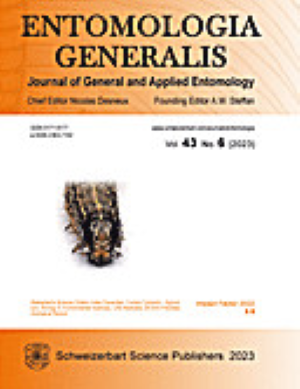蚜虫和瓢虫对铅通过土壤和蚕豆转移的反应
IF 4.6
1区 农林科学
Q1 ENTOMOLOGY
引用次数: 0
摘要
重金属对农业生态系统的影响一直是社会关注的话题。本研究调查了铅(Pb)在土壤-蚕豆(豆科)-Megoura crassicauda(半翅目:蚜虫科)-Harmonia axyridis(鞘翅目:胭脂虫科)系统中的转移情况。土壤中的铅可转移到蚕豆中,根部的积累量最高,其次是茎和叶。蚜虫和瓢虫也能通过食物链积累铅。有趣的是,蚜虫取食组蚕豆根部的铅含量明显高于非蚜虫取食组。铅胁迫明显降低了蚕豆的发芽率和苗高,并抑制了根的伸长。铅胁迫下蚜虫体内脱卤酶(TRE)、脱卤糖-6-磷酸合成酶(TPS)和卵黄素(Vg)的表达水平、TRE活性和碳水化合物含量都发生了变化。在铅处理下,第二代和第五代蚜虫产生的后代数量明显减少。此外,高浓度铅处理可延长瓢虫第二和第三龄幼虫的发育时间。取食受铅污染的蚜虫会影响瓢虫的存活率。我们的研究结果进一步证实了铅在食物链中的生物转移,并探索了蚜虫和瓢虫的适应机制。这些相关结果为进一步探索铅胁迫下植物和昆虫体内铅平衡的分子机制提供了理论依据。本文章由计算机程序翻译,如有差异,请以英文原文为准。
Responses of aphid and ladybird to lead transfer through soil and broad beans
The impact of heavy metals on agricultural ecosystems has consistently been a topic of social concern. This study investigated the translocation of lead (Pb) along the soil – Vicia faba L. (Fabales: Fabaceae) – Megoura crassicauda (Hemiptera: Aphidoidea) – Harmonia axyridis (Coleoptera: Coccinellidae) system. Lead in soil could be transferred to broad bean, and the accumulation amount was highest in roots, followed by stems and leaves. Aphids and ladybirds could also accumulate lead through the food chain. Interestingly, the lead content of broad bean roots in the aphid feeding group was significantly higher than that in the non-aphid feeding group. Lead stress significantly reduced the germination rate and seedling height of broad bean, and inhibited root elongation. The expression levels of trehalase (TRE), trehalose-6-phosphate synthase (TPS), and vitellogenin (Vg), TRE activity, and carbohydrate content in aphids changed under lead treatment. The number of offspring produced by the second and fifth generation aphids was significantly reduced under lead treatment. Furthermore, high concentrations of lead treatment can prolong the development time of the 2nd and 3rd instar larvae of the ladybird. Feeding on aphids contaminated with lead can affect the survival of ladybirds. Our results further confirm the biological transfer of lead in the food chain and explore the adaptive mechanisms of aphids and ladybirds. These relevant results provide a theoretical basis for further exploring the molecular mechanism of lead homeostasis in plants and insects under lead stress.
求助全文
通过发布文献求助,成功后即可免费获取论文全文。
去求助
来源期刊

Entomologia Generalis
生物-昆虫学
CiteScore
7.10
自引率
18.80%
发文量
72
审稿时长
>12 weeks
期刊介绍:
Its scope covers all aspects of basic and applied research dealing with insects and more broadly with arthropods inhabiting wild, agricultural and/or urban habitats. The journal also considers research integrating various disciplines and issues within the broad field of entomology and ecology.
Entomologia Generalis publishes high quality research articles on advances in knowledge on the ecology and biology of arthropods, as well as on their importance for key ecosystems services, e.g. as biological control and pollination. The journal devotes special attention to contributions providing significant advances (i) on the fundamental knowledge and on sustainable control strategies of arthropod pests (including of stored products) and vectors of diseases, (ii) on the biology and ecology of beneficial arthropods, (iii) on the spread and impact of invasive pests, and (iv) on potential side effects of pest management methods.
Entomologia Generalis welcomes review articles on significant developments in the field of entomology. These are usually invited by the editorial board, but proposals may be sent to the Editor-in-Chief for preliminary assessment by the editorial board before formal submission to the journal. The journal also considers comments on papers published in Entomologia Generalis, as well as short notes on topics that are of broader interest.
 求助内容:
求助内容: 应助结果提醒方式:
应助结果提醒方式:


